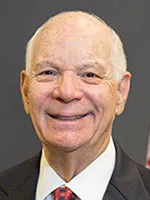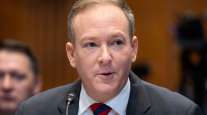Senior Reporter
Congressional Politics Impede 2023 Legislative Agenda

[Stay on top of transportation news: Get TTNews in your inbox.]
WASHINGTON — In 2023, several high-profile federal policy proposals relevant to the trucking industry were unable to cross the legislative finish line. The culprit: congressional politics.
A series of leadership updates throughout the year, especially in the Republican-led U.S. House of Representatives, contributed to Capitol Hill’s most recent round of legislative gridlock.
Due primarily to GOP infighting in the House, big-picture legislation sat on the sidelines awaiting consideration.
For instance, a vote on a funding update for federal transportation agencies, which needed to pass by October, was instead pushed to early 2024. Supply chain legislation, such as freight rail safety and a truck parking bill, also fell victim to a very public display of governing inertia.

Johnson
Speaker Mike Johnson (R-La.), the Republican caucus’ second leader in less than a year, led the passage in the fall of a short-term funding bill that averted a partial government shutdown. The new speaker went on to pledge a commitment to advance the funding measure in early 2024. No update was offered on supply chain measures.
Johnson succeeded Kevin McCarthy (R-Calif.), whose ouster was provoked by a small group of fellow Republicans about nine months into his tenure as speaker.
“We’re fighting. But you have to be wise about choosing the fights,” Johnson told reporters on Capitol Hill in November shortly after the House’s bipartisan approval of the short-term funding bill. “You gotta fight fights that you can win. And we’re going to. And you’re going to see this House majority stand together on our principle. ... Look, it took decades to get into this mess. I’ve been at the job less than three weeks.”
Truck Parking
Despite its bipartisan nature, a bill aiming to facilitate access to parking for truck drivers from every corner of the country did not advance in 2023.
American Trucking Associations repeatedly called on Congress to approve the legislation, which had garnered broad support from stakeholders. And during a wide-ranging hearing about transportation safety on Nov. 7, Iowa Motor Truck Association President Brenda Neville renewed ATA’s call for passage of the bill meant to expand access for truck parking.

A tractor-trailer parks in a lot in Fairfax, Va. (Aaron Perryman/Transport Topics)
“The priority that we have right now is — as I said in my opening statement — we have 313,000 parking spaces and 3.5 million drivers. So, the shortage is real in every single state. And the option that truck drivers have now is that if they can’t find a space, they are parking on the side of the road. They’re parking on an off-ramp,” Neville said at the EPW hearing. “We need more truck parking across the nation.”

ATA President Chris Spear continued sounding the alarm on the need for additional truck parking. Earlier this year, Spear celebrated the lawmakers instrumental in promoting greater access to parking for truck drivers.
“The lack of safe and accessible truck parking places an enormous and costly burden on our nation’s truck drivers as they work to deliver for the American people. Given the chronic nature of this issue and its national scope, it is imperative Congress takes action to provide dedicated funding to expand commercial truck parking capacity,” Spear said in March. “We thank Sens. [Cynthia] Lummis and [Mark] Kelly and Reps. [Mike] Bost and [Angie] Craig for their leadership on this vital piece of legislation, which will strengthen our supply chain and improve highway safety for all motorists.”
FET Repeal
High on the trucking industry’s agenda this year was pursuing a repeal of a tax on the purchase of new trucks. ATA and members of the Clean Freight Coalition renewed their push for repealing the World War I-era 12% excise tax on new commercial trucks. Doing so, the groups explained, would facilitate the introduction of more energy efficient equipment in the commercial transportation marketplace.

Cardin
This year, stakeholders directed their message primarily to the leadership of the congressional tax-writing committees. “Removing the [federal excise tax] is a critical step to deploying these environmentally friendly technologies faster across the entire industry,” the groups wrote lawmakers.

Young
Responding to industry concerns, Sens. Ben Cardin (D-Md.) and Todd Young (R-Ind.) unveiled the Modern, Clean and Safe Trucks Act of 2023, which takes aim at the excise tax.
“The current federal excise tax has become a barrier to our progress in encouraging cleaner and greener technology,” Cardin said in March. “I am proud to support tax policy that enables Maryland manufacturers to innovate and deploy cleaner and safer technologies in our trucking industry. Our legislation will spur growth and competitiveness while making our roads safer and less polluted.”
“It’s time to repeal this outdated and onerous tax on our Hoosier truckers,” Young said in a statement that accompanied the bill’s introduction. The two senators are members of transportation policy committees.
House policymakers had introduced a similar version. “Repealing the 12% federal excise tax on heavy trucks and trailers will help all businesses reduce costs, address supply chain challenges and lower costs for essential goods for families, especially in rural areas,” explained Rep. Doug LaMalfa (R-Calif.), a co-sponsor, and a senior member of the Transportation and Infrastructure Committee.
Supply Chain
Months after the Senate Commerce Committee advanced the comprehensive bipartisan Railway Safety Act, Chairwoman Maria Cantwell (D-Wash.) kept pushing to advance the measure through Congress.

Cantwell
In a resolution endorsed by her colleagues, Cantwell indicated: “The Feb. 3, 2023, Norfolk Southern train derailment in East Palestine, Ohio, which resulted in the burning of [six] vinyl chloride tank cars and forced the evacuation of approximately 2,000 nearby residents, was a reminder of the risks posed by hazardous materials transportation.”

Jefferies
A prominent industry stakeholder has championed safety and a willingness to arrive at a sound legislative response. “Committee negotiations on the Rail Safety Act have yielded substantive improvements that advance stakeholders’ shared goal — enhancing rail safety, supporting first responders and keeping our communities safe,” Association of American Railroads President and CEO Ian Jefferies said in May. “Railroads support items of this bill and remain fully committed to working with the committee and all members of the Senate to build on these improvements, with the ultimate goal of ensuring all provisions result in meaningful data-driven safety advancements that all can support.”
Jefferies went on: “At the same time, challenges remain with certain provisions, including those that mandate crew staffing models, expand hazmat transportation operating requirements, micromanage detector networks, and unnecessarily broaden manual inspections. In a piece of safety legislation, each provision should be clearly designed to rectify a current safety challenge.”
IIJA
It might be easy to take the availability of billions of dollars for transportation connectivity for granted. But prior to the 2021 enactment of the $1.2 trillion Infrastructure Investment and Jobs Act, states from Oregon to Georgia were scrambling for dollars to improve their mobility networks.

President Joe Biden speaks at the Amtrak Bear Maintenance Facility on Nov. 6 in Bear, Del. (Matt Rourke/AP)
The IIJA turned 2 years old on Nov. 15 and President Joe Biden associated the bipartisan infrastructure law with his “Bidenomics” re-election agenda. “How can you be the leading country in the world and have a second-rate infrastructure — second-rate infrastructure? It’s not possible,” the president said in November. “[IIJA] included the largest investment in passenger rail since Amtrak was created 50 years ago: $66 billion for world-class rail right here at home. And that includes the largest investment in the Northeast Corridor since the Pennsylvania Railroad laid down these tracks in 1850.”
Transportation Secretary Pete Buttigieg is helping to guide the implementation of Biden’s infrastructure agenda. Specific to rail funds, the secretary observed: “These investments will make our busiest passenger railroad safer, faster and more reliable, which means fewer delays and shorter commutes for the 800,000 passengers who rely on the Northeast Corridor every day.”
Want more news? Listen to today's daily briefing above or go here for more info
Senior congressional Republicans, meanwhile, maintained a focus on the IIJA’s implementation. House transportation committee Chairman Sam Graves (R-Mo.) led his panel’s careful review of the Biden administration’s management of the law. The pace and directives associated with IIJA’s implementation, especially at the U.S. Department of Transportation, raised concerns from Republicans.
“DOT has issued a number of grant requests and awards. As we’ve raised before, these grant programs should follow the intent of the law and focus on projects that actually improve our infrastructure network and mobility, and not use guidance that undercuts congressional direction just to accelerate projects that fit the administration’s own agenda,” Graves told Buttigieg during a hearing in September. “So it’s clear, we have work to do in managing current transportation policy and funding.”




